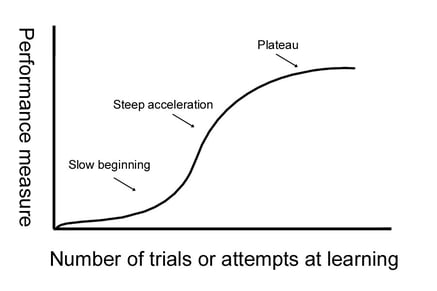For the past couple of months I’ve been drinking from a fire hose as I struggle to come up to speed on a new client’s business and technology. The whole experience has been stressful but has also been a great reminder of the wonders of the learning curve.
We’ve all experienced the S-shaped learning curve when trying to master motor skills like riding a bike or skiing:
The curve rises slowly as you become familiar with the basics of a skill. The steep part occurs when you have enough experience to start “putting it all together.” Then your progress is constrained by access to resources or some physical limit.
When trying to grasp and apply a larger body of knowledge the learning curve is repeated many times. As you become proficient in each task or bit of knowledge (following the “S”-shaped learning curve), you can then integrate concepts to generate novel ideas and solutions. You may never be an expert in any one area but you become useful nonetheless (thank goodness!).
Think about the skills needed to build a house. Simply mastering the use of a hammer is not enough. You also need to learn to use a saw, a plane, a level and a screwdriver. In fact, to create a perfectly adequate house, you don’t need a PhD in hammering – you just need to be good enough that the rest of the project can progress. The knowledgeable generalist “handyman” can actually build a product that a highly skilled specialist never could.
The point is to acknowledge the value of generalists in creating unique, integrative results – even in highly technical organizations. Yes, it rarely hurts to know more and be more capable in a task however there is a point of diminishing returns. Sometimes it’s better to ride the steep part of a new learning curve than to eke out small improvements along the flat top of your current one. I suppose I’ve made a career of this sort of curve hopping.
Who are the generalists in your organization? They probably have titles like “System integration”, “Sales engineering”, “Customer service”, “Business development” or “Marketing”. Many of the managers in your organization (and the consultants you periodically hire) also fall into the generalist category. Ironically, these are the people we sometimes dismiss as “overhead”. Yet without these handyman types we might find ourselves shivering amongst a pile of well hammered lumber rather than warm and dry with a roof over our heads!

